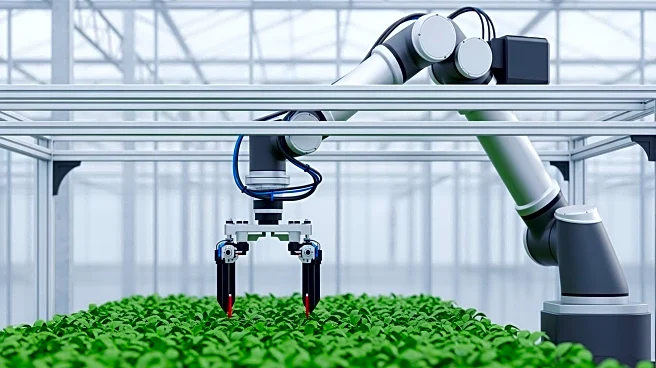What's Happening?
Artificial intelligence and robotics are transforming agriculture into a data-driven ecosystem, enhancing precision, sustainability, and automation. A study titled 'AI and Robotics in Agriculture: A Systematic
and Quantitative Review of Research Trends (2015–2025)' highlights the technological evolution in agriculture over the past decade. The study, conducted by institutions in Morocco and the United States, analyzed over 10,000 publications to map the integration of machine intelligence into farming. Key technologies include drones, computer vision, and smart sensors, which enable real-time data interpretation for soil, water, crops, and pests. Supervised learning models, particularly deep learning architectures, dominate AI-driven agriculture, aiding in crop monitoring, disease detection, and yield estimation. Drones are the leading technology, facilitating precision irrigation and pest control. The study notes that China, India, and the United States are at the forefront of AI and robotic research in agriculture, while regions like Sub-Saharan Africa and Southeast Asia lag due to disparities in infrastructure and investment.
Why It's Important?
The integration of AI and robotics in agriculture is crucial for addressing global challenges such as climate change, labor shortages, and food security. By automating farming processes, these technologies can increase efficiency and productivity, potentially reducing costs and resource use. However, the study highlights socioeconomic and ethical concerns, including labor displacement and technology inequality. The shift to autonomous systems may lead to unemployment in regions where agriculture is a primary livelihood. Additionally, the lack of digital infrastructure and policy frameworks in developing regions could hinder responsible AI adoption, risking exclusion of small-scale farmers from technological advancements. The study advocates for a balanced approach to innovation, emphasizing inclusivity and equitable technology transfer.
What's Next?
The study proposes a strategic roadmap for sustainable agricultural AI, focusing on domain-adaptive models, explainable AI frameworks, and energy-efficient technologies. It calls for investment in swarm robotics and climate-smart AI solutions to optimize soil health and water efficiency. International collaboration is deemed necessary to establish shared data frameworks and open-access AI repositories, ensuring ethical use and accelerating innovation. These steps aim to align agricultural automation with global sustainability goals, promoting environmental resilience and social equity.
Beyond the Headlines
The study underscores the need for ethical considerations in AI-driven agriculture, highlighting issues such as data privacy and transparency. The limited real-world validation of AI models raises concerns about their reliability outside controlled settings. Crop bias in research, favoring cereals over horticultural crops, risks excluding diverse farming systems. Addressing these challenges requires a focus on inclusive policy development and capacity building to support smallholder farmers and ensure equitable access to technological advancements.









